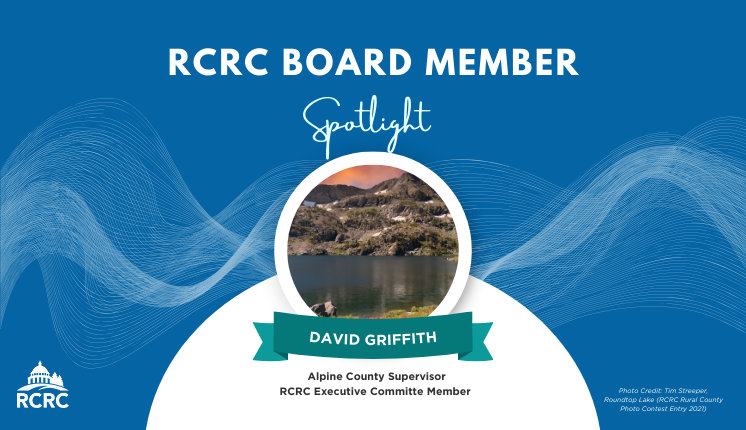
Welcome to the next installment of the RCRC Board Member Spotlight, a recurring feature of the Barbed Wire! The Board Member Spotlight is intended to familiarize subscribers with RCRC Board members, providing insights from their background in public service to their views on pressing rural county issues. RCRC is pleased to introduce the subject of the May 2025 Board Member Spotlight, Alpine County Supervisor and RCRC Executive Committee Member, David Griffith.
1. What inspired you to pursue a career in public service?
My primary motivations were twofold. As an immigrant I wanted to give back to the country that gave me opportunity, and as a geologist I believed that the lack of scientists in elected positions was leading to poor policies.
2. What is one piece of advice you might share with a newly elected county supervisor based on your experience?
Do your homework and work with staff to advance your priorities, but also hold staff to account.
3. What makes your community unique?
With a population density of less than 2 people per square mile, 95% federal land, 56% Wilderness Area, and 16% Inventoried Roadless Area, Alpine County is mostly forested mountains with scattered small communities on both sides of the Sierras. We are ~25% Native American and have probably the best tribal relationship of any county in California, and perhaps even the nation.
4. What is a policy or initiative in your county of which you are most proud?
It sounds boring, but getting our unfunded pension and Other Post-Employment Benefits (OPEB) liabilities under control is probably the most significant achievement.
5. How long have you served on the RCRC Board and why do you believe the work of RCRC to be important?
I am now in my ninth year on the RCRC Board. As the smallest county in California population-wise we are at the mercy of the federal and state agencies. Without the support of RCRC and its excellent staff we would have no voice in decisions that affect us. The RCRC Board is also a great forum for discussing problems and solutions with supervisors from other counties.
6. What do you view as the most pressing rural county issue for RCRC to engage on over the next few years?
Getting the state and federal governments to recognize that programs that make sense for large urban populations often are unworkable and counterproductive in lower population rural counties.
7. What is something about you that people may be surprised to learn?
After grade school I chose to go to a technical/commercial high school because the other alternative only offered an academic track, which meant I would have to take Latin. Later my parents sent me to a school that required Latin, and I loved it. Now I can’t read or speak it, but I loved it as a teenager.
